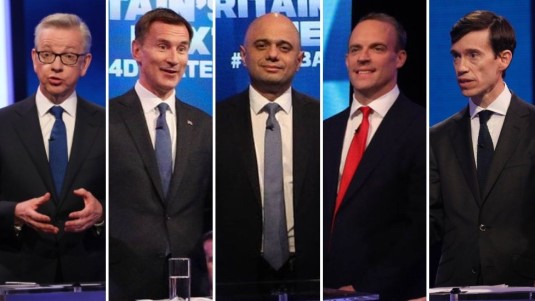
Not really. Asked about their weaknesses, we got trite answers. Michael Gove was "impatient", Dominic Raab "restless" and Sajid Javid "stubborn". Not what normally passes for frailties in mainstream politics. Rory Stewart hit the right note with the audience by saying he didn't have much time for the masculine style of debate or leadership, preferring to weigh things up and think. Yes, thinking is a weakness. Nevertheless, having given an honest answer Jeremy Hunt was compelled to give one too, saying he could be much better at communicating. I wonder if he'd have peddled a cliche had he gone before Stewart.
On Brexit, there wasn't much in the way of answers. Stewart wants to get May's dead deal through the Commons, without saying how. Raab peddled his closure of parliament pitch, something obviously designed to seduce Brexit Party supporters before they properly coalesce but, again, without saying how he might prevent the Commons from derailing his ridiculous scheme. And Gove, Hunt, and Javid all offered permutations on deal if we can, no deal if we must. All were short on answers about how they would handle it differently.
Asked about their number one priorities, there were worrying signs that Raab and Hunt are aware of the hole the Tories are in and what needs to be done to get out. That is get the cycle of property acquisition and modest levels of social mobility moving again and hope the under 50s will forget the hardship they've been subjected to this last decade. For both, it was about addressing education and work. For Gove children were his priority, for Javid it was fixing public services, and Stewart (and Hunt) adult social care. All worthwhile, but as Krishnan Guru-Murthy pointed out, climate change was conspicuous by its absence - an observation greeted with splutters of protest from Gove.
How was their performances? No one dropped a clanger. Occasionally Hunt was weirdly stiff, Javid sometimes unsure of himself and Raab, conversely, too sure. Gove proved fairly collegial and complementary of his opponents, but it was Stewart who had the night. He seemed most in tune with the audience, who were comprised of floating voters, and consistently got the biggest rounds of (polite) applause. He also had the best line. In his critique of received leadership styles, he declared "we've got to move from the me to the we". I suppose you had to be there, but for a party usually associated with selfishness and dog-eat-dog it chimed. A shame for Stewart then that none of the participants and few of the viewers are part of the selectorate he needs to address.
There was an obvious problem with this particular format, apart from the noted absence of the star turn. And that was the floating voter audience. Unlike, say, the 2017 debates, pointed questions were missing. Not one of these men were held to account for the actions of the government. Hunt wasn't taken to task for what he has done to the NHS. Gove not held responsible for what he did to education. If you didn't know British politics, you could be forgiven all five were little lambs fresh upon the world. Time after time, our contestants attacked some aspect of education or social care or housing as if they are not joint authors of our present mess.
The second issue with the debate is it doesn't matter. The Tory faithful won't care that Stewart turned in a points win. Indeed, as Channel 4 is an anti-Tory, anti-Brexit liberal-bolshevist bastion they will take it as more evidence that he is their man. Given C4 occupies this space in the Tory imagination, the refusal of Johnson to participate won't hurt his chances at all. Well, maybe not where the immediate contest is concerned. By ducking a potential pile on, bottler Boris remains pristine and gaffe free. Unfortunately for them, while this is an internal contest it is, in case they had forgot, an extended interview for Prime Minister. There is wider public interest than would otherwise be the case and Johnson was found missing from action. This didn't play well for Theresa May last time, and it could bite Johnson further down the line.
1 comment:
A fair analysis
You are probably giving Stewart a little too much credit, his success, if that's what it was, probably had more to do with his different communication style to the others than to anything he had to contribute by way of a way forwards.
Post a Comment